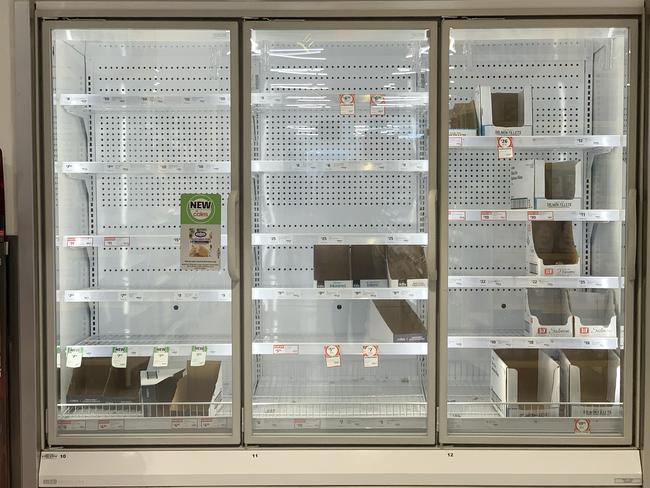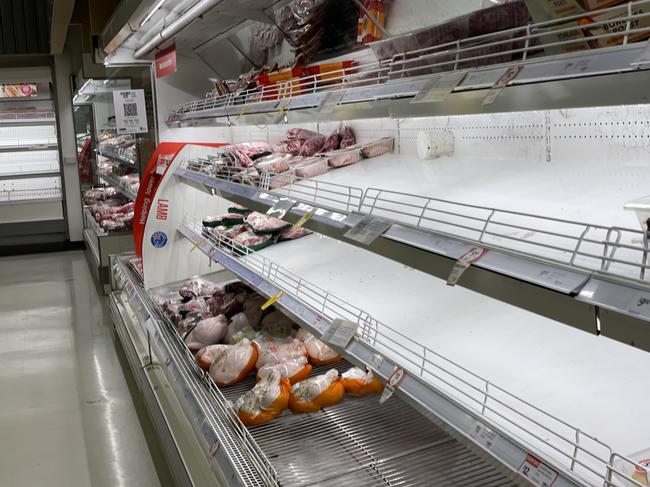Woolworths puts limits on items to stop panic buying after Coles
Woolworths has followed Coles in reintroducing buying limits on select products as shelves remain empty. See how it affects you.

Coronavirus
Don't miss out on the headlines from Coronavirus. Followed categories will be added to My News.
Woolworths has become the latest supermarket to reintroduce buying limits on select products across the country as shelves remain empty as a result of supply-chain issues and panic buying.
With shelves resembling panic-buying scenes of March 2020 when the Covid-19 pandemic first swept through the country, the supermarket giant has been forced to introduce nationwide buying limits for customers.
As of Thursday, Woolies announced the limit of two packs per customer on toilet paper and painkillers.

“This is a precautionary move following recent food and grocery supply chain constraints and pockets of increased demand across select categories,” Woolworths said in a statement.
“The limits will ensure more customers have fair access to toilet paper and analgesics.”
In addition to the nationwide limits, West Australians will have a limit of two packs of mince, sausages and chicken products “due to signs of excessive buying”.
The supermarket still has purchase limits on rapid antigen tests.
Woolworths Director of Stores Jeanette Fenske said she understands it is an “anxious time” for customers across the country.
“We will remain open and operational as an essential service,” Ms Fenske said.

“We will continue to closely monitor product availability across our stores, with stock continuing to be sent to stores daily. Customers will notice some gaps on shelves but we’re doing all that we can to meet demand.”
“We encourage everyone to be mindful of others in the community and to continue shopping in reasonable quantities.”
The move comes after Coles slapped purchase limits on toilet paper and painkillers as products fly off shelves due to panic buying.
Customers can only take home one pack of toilet paper and two packs of painkillers such as paracetamol, ibuprofen and aspirin.
They join mince and sausages (two packs), chicken breast and thigh (two packs or six fillets from the deli). There also is a one-pack limit on Covid-19 rapid antigen tests.
Coles urged customers to “purchase only what they need”, as the impact of the pandemic causes heartache.
“Recent increases in Covid case numbers in the community have required more people to isolate, which has impacted the availability of labour throughout the food supply chain,” a spokesperson said.

“At a time when inventory levels were already reduced in the post-Christmas period, our distribution centres are receiving fewer inbound deliveries and we have fewer team members available to process and dispatch stock to our stores.
“Meanwhile demand is elevated as customers choose to eat more meals at home to reduce their exposure to the rest of the community.”
Coles has welcomed news that in Victoria, NSW, Queensland and the Northern Territory “essential workers” in food production and logistics will be exempt from needing to isolate if they are close contacts of a Covid case.
“The new measures, which are subject to stringent safety protocols including the use of rapid antigen testing, will support us to deliver more of the food and essentials our customers need to our stores across Australia,” the spokesperson said.
“We thank our customers for their patience as we work with our suppliers and transport partners to increase deliveries and return a full range of products to our stores over coming weeks.”

ALDI has no purchase limits in place, but availability has been impacted.
The supermarket’s CEO Tom Daunt wrote to customers, telling them “As the country transitions from a suppression strategy to one where we live with Covid, we’ve already begun to encounter some hurdles - most notably, labour shortages due to Covid sickness or isolation. Many of our valued business partners that supply our products are short of staff - and at ALDI, we’re experiencing this too. But rest assured, there isn’t a food shortage, just complications and delays associated with less employees.
“The rise in COVID cases has significantly impacted supply of food and groceries, as labour shortages in food production and supplier logistics have skyrocketed. From farms to factories, we’re seeing fruit pickers, meat processors, and countless others isolating, as well as truck drivers and warehouse employees, all of which impacts availability of certain products.”
The supermarkets’ differing responses come with painkillers being completely cleared off many Australian shelves, as panic buying sparked by the highly infections Omicron variant reaches new heights.
Desperate shoppers took to social media this week claiming paracetamol and ibuprofen had all but been cleared out, sharing photos of near-empty shelves across multiple supermarkets and pharmacies.

Deputy chief health officer Professor Michael Kidd earlier urged Australians to stock up on over-the-counter painkillers, as Covid cases skyrocketed into the tens of thousands each day.
Professor Kidd said having the medication on hand would help to manage fevers and mild aches or pains.
“The first thing to do is to be prepared,” he said.
“My advice is that you make sure you have some paracetamol or ibuprofen at home in case you’re diagnosed with Covid-19.
“Paracetamol or ibuprofen can be used to manage fever and aches and pains.
“It’s important to be prepared because you won’t be able to go to your supermarket or pharmacy if you are diagnosed with Covid-19.”
The warning caused a wave of panic buying of the products in supermarkets and pharmacies.
On Tuesday, Twitter users posted dozens of photos of empty shelves to the social media network.
Ardeer, Vic pic.twitter.com/G5j9U7ZVAa
— Caleb (@Toey_tucker) January 10, 2022
Our local Woolies was all out of panadol, nurofen and cold and flu meds on Thursday. Also toilet paper and tissues. pic.twitter.com/dFQK91r8i2
— faranaaz (@faranaaz) January 8, 2022
Went to get some paracetamol in Preston Victoria pic.twitter.com/FhTQQJ8zvM
— DarebinDyke 💉💉 (@DarebinDyke) January 10, 2022
So not only are people panic buying toilet paper again but now they are also stocking up on panadol and nurofen, most stores are sold out now 🙃
— Violet (@VioletsZone) January 10, 2022
GSK Consumer Healthcare, the company responsible for the production of Panadol, urged people to not hoard the medicine, conceding there was limited supply in some stores and pharmacies.
“We urge Australians to responsibly purchase for their immediate needs to ensure there is supply for everyone,” a spokesperson said.
“Provided this occurs, there will be adequate supply of Panadol within the grocery and pharmacy networks to ensure all Australians have access.
“Given the current situation, where possible, orders are being advanced and stock redeployed from other markets. We are also working with our business partners to ensure that stock is distributed widely.”
More Coverage
Still no Rapid Antigen tests at my local Woolies. None last night. None this morning. Meat section cleared out. Panadol/Nurofen section cleared out. Sanitiser section cleared out.
— William Franco (@WillyFranco) January 10, 2022
Originally published as Woolworths puts limits on items to stop panic buying after Coles




